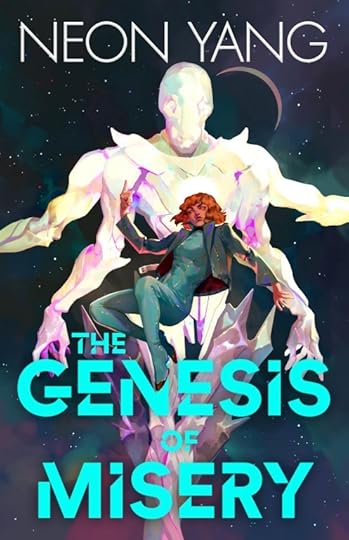A Book of Meh Revelations: The Genesis of Misery by Neon Yang
 Highlights
Highlights ~angelic mecha suits
~magic gemstones
~what’s the difference between hallucinations and visions?
I feel like I should have enjoyed this much more than I did. Broken down to its constituent parts, I love everything that makes up Genesis: the religious themes and imagery; the jagged-edged nonbinary MC who is utterly convinced she’s not the Messiah; mysterious gemstones with all kinds of otherworldly properties.
And yet.
I think part of the problem is that, in this kind of set-up, we all know the Empire is – best-case scenario – mistaken in its take on Life, The Universe, And Everything; worst-case scenario, they’re deliberately lying about everything, and most especially The Enemy. We all know that The Enemy is either misunderstood or misrepresented; that they are far more likely to know The Truth than the protagonist’s side are. And while it’s a very cool change of pace to have our MC go from unbeliever to fanatic rather than the other way around, it still meant I was impatiently waiting for the Twist Reveal the whole time I was reading…which undercut basically all of the tension.
Also, while I can’t talk about it in any detail at all, the epilogue massively pissed me off. It rendered the entire rest of the book pointless. The whole thing from start to finish was a massive waste of everybody’s time. What on earth was {spoiler}’s goal then??? If {spoiler} wanted {spoiler} then there were much, MUCH simpler ways of making it happen than the entire plot of the book. What even.
Argh.
I found the worldbuilding really simplistic, I’ve gotta be honest – although in total fairness, the epilogue does make it clear that in fact the worldbuilding is much more complicated than we think it is. That doesn’t really change the fact that this aspect of Genesis was pretty disappointing and boring, though, since most of the book is not the epilogue. The most interesting thing was the holystones, the various materials that each have unique properties like emitting light or levitating, and how the Empire utilises them, but with basically no info on where they come from or how they work…
Basically, The Genesis of Mercy felt like it was only a sketch of the world, to be filled in later, in later books. There are brief mentions and glimpses of things that hint at interesting mysteries, but there’s no follow-through in this book, and that is both frustrating and leaves the actual story we have in front of us feeling very shallow.
(And what is up with referring to a military corps as a banquet? Which breaks down into courses, then dishes, then servings? That was incredibly bizarre and is never explained. Why would you name your military like you’re offering up your soldiers to be devoured by the enemy?)
Misery herself is easily the strongest part of the book: she comes across as narcissistic and manipulative, but only because she’s out to survive and has no one else to depend on, well aware that the systems of power she’s been caught up in could crush her at any moment. She’s spiky and smart and ruthless and irreverent, and her backwater upbringing gives Yang a way to introduce the reader to the main body of the Empire as Misery herself is introduced to it.
Unfortunately, I don’t think the gift of Misery’s insight – her ability to understand people and know exactly what they’re thinking and feeling – worked as well as a means to illuminate the rest of the cast. It becomes a whole lot of telling rather than showing – we’re effectively lectured on the inner workings of each secondary character, which backfires massively by making them read as extremely one- or two-dimensional. No one feels like a real person except Misery, and it’s possible, actually, that that was deliberate – the narrator isn’t interested in anyone but Misery, and Misery herself doesn’t seem to care much for other people either. But even if it was done intentionally, it really doesn’t read well. I was also confused that the narrative set up a literal team of characters around Misery, but then that team was pretty irrelevant; Misery doesn’t form much connection with them, and you could have replaced most of them with unnamed characters without affecting the plot.
Then Misery goes from atheist to fanatic after a Big Reveal, and while intellectually I appreciate this – usually we see characters lose faith, not gain it, over the course of their stories, so this is a nice change of pace – from a reading perspective it made her very boring and extremely unpleasant. I think the unpleasant part was deliberate – we’re not meant to like her anymore – but everything that made her an interesting character was just gone. Which left me with no drive at all to finish the book.
I did, though, but I’m not sure why I bothered. The plot is very…straightforward? Predictable? I saw another reviewer describe it as sequential, and maybe that’s the right word; things just seem to happen, with no…no driving force? No impetus? They happen because they happen. Misery goes from the capital to a military base to training to revelation to battle, and on paper that should all be very grand and dramatic, but somehow it never felt that way while I was reading. It’s just one damn thing after another, as they say.
I didn’t skim, but I really had to force my way through the last 20% or so of Genesis. There was a lot of telling, a lot of reveals the groundwork was never laid for (no clues that the reader could put together to work out the conclusion, even in hindsight), a lot that was summarised instead of shown to us. And yet, quite a bit that I was able to predict from the get-go, simply because this is how this kind of story goes, not because Yang led me to the Le Gasp! moments step by step.
I don’t think there’s anything wrong with the actual prose, but reading this book made me so Tired. Despite the revelations in the epilogue, I don’t think I’ll be picking up the sequel. However, I seem to be very much in the minority on this one, so if the blurb sounds interesting to you, there’s a good chance you’ll enjoy it. But don’t bank on loving this just because you loved the Tensorate series; Tensorate and Genesis are very different books.

The post A Book of Meh Revelations: The Genesis of Misery by Neon Yang appeared first on Every Book a Doorway.



